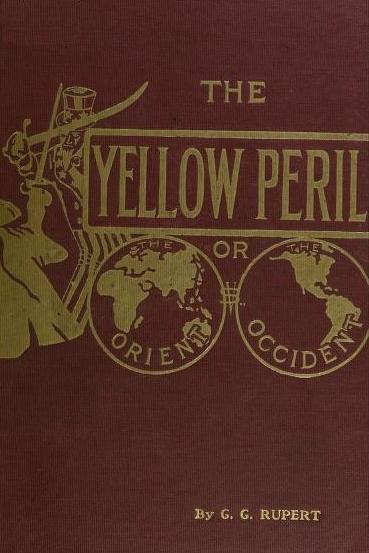
PATRICK LAWRENCE: Our Latest Sinophobia Fest
Watch, read, and listen as Washington and its media clerks manufacture our consent for a full-dress Cold War with China.
One hundred nine years ago, one G. G. Rupert published an extraordinary book called “The Yellow Peril, or The Orient vs. The Occident as Viewed by Modern Statesmen and Ancient Prophets.” The book was a racist diatribe all dressed up as learned historical scholarship. It quickly proved a best-seller and brought Rupert, a Seventh-Day Adventist preacher in Oklahoma, a lot of money and passing fame.
With the Covid–19 virus still spreading, you have to ask how far we’ve come as a similarly befouled wave of Sinophobia now rolls in upon us. First editions of Rupert’s book fetch $900 on the used-book sites. If you have ever wondered whether our religious belief in “progress” might be nothing more than a collective self-deception enduring since the mid–19thcentury, Rupert’s 526–page p.o.s. (as the expression goes in newsrooms) will help you along.

Spells of scapegoating paranoia such as Rupert’s have come and never quite gone since William Randolph Hearst introduced the “yellow peril” genre in his newspapers at the turn of the 20thcentury. Rupert now goes down as a foolish rube and Hearst a cynical conniver in pursuit of circulation.
But let us not miss that it is their direct descendants — on Capitol Hill, at the State Department, and in the American press — who are up to nothing more nor less than the same shameful chicanery as we look for someone to blame for our pitifully inept response to the Covid–19 crisis.
China cultivated the Covid–19 virus in a Wuhan biological warfare laboratory. China has purposely infected the West as an act of aggression. “The Chinese Communist Party will pay a price for what they did,” says Mike Pompeo, the most dangerously dumb secretary of state to serve in my lifetime. Grandstanding dreamers in Congress intend to make China pay trillions of dollars in retribution. (Wait for it.) Missouri is suing China for “lying to the world.” (Wait for this, too.)
From San Francisco — of all cities, San Francisco — we now read reports of white pedestrians spitting on Chinese–Americans at stoplights. Let us consider such events carefully as we purport to be repelled. The Biden-for-president campaign spit on the Chinese last week in a much-remarked ad G. G. Rupert or Hearst could have written. Settle in: Who out-xenophobes who is now set as the defining issue in the 2020 election contests.
It is the corona virus’s vicious spread that prompts all this irresponsible noise. But the vehemence of this surge of Sinophobia has something to tell us. A new round of anti–Chinese hysteria has been increasingly manifest among Americans since China’s emergence as a regional and global power became evident in the early years of this century—roughly coincident with the centennial of Rupert’s book. The Covid–19 virus has merely let Jack out of his box.
Damn, this ad by Joe Biden is brutally effective. Trump can run, but he can’t hide. pic.twitter.com/pX6Uf5ANXS
— Jon Cooper ?? (@joncoopertweets) April 18, 2020
Sound of Empire in Eclipse
Properly understood, what we hear now is the long-building sound of an empire whose preeminence is in eclipse. This is why, as polluted as we find the vox populi on social media, it is the leadership in Washington and its clerks in the press whose expressions of fright and dread are the shrillest when America looks across the Pacific, and who speak with the gravest intent.
The list of the American leadership’s anxieties is long and continues to grow. A decade back it went like this: A manipulated yuan was making Americans buy too many Chinese products, China was gaining unfair footholds in developing nations, China was competing too aggressively in global commodity markets — this so it could make all those products Americans were buying.
On the security side, China was gaining too much influence in diplomatic affairs, there were too many Chinese naval vessels sailing the waters off its shores, and China was doing well in the “information war,” Washington’s euphemism for who has better PR.
All of that remains on the table. The information war has begun to draw blood with the expulsion of Chinese correspondents from the U.S. and Americans from China. China is still manipulating its currency, let facts not speak otherwise. China’s presence in the South China Sea remains a standby source of fear and trembling. And damn those Chinese, they are still forcing us to buy products we want at prices that allow American corporations to stiff American workers and keep their quarterly results rising.
 Image from Biden 2020 campaign ad. (Screenshot)
Image from Biden 2020 campaign ad. (Screenshot)
The facts of the Covid–19 phenom need to be sorted, and it would be reassuring to think cool heads will get this done after the world has drawn together to defeat it. This remains a “maybe.” It is not clear there are any cool heads among us, and the world is hardly drawing together in response to a crisis common to us all.
In the meantime, it is well to recognize what is proceeding under the cover of our collective folieas to China’s alleged responsibility after the fact. We watch, read, and listen as Washington and its media clerks manufacture our consent for a full-dress Cold War with China, the Russian attempt having failed to deliver the goods. However long it takes to overcome the Covid–19 virus, the new Cold War with the mainland will plague us longer.
The Pentagon, eager to quash any suggestion that its preposterous budget be reconsidered, is full-tilt in consolidating its forward position at the western end of the Pacific. A month ago the Defense Department sent Congress a request for $20 billion in additional funds to reinforce what we’re now calling the “Indo–Pacific Command.”
This seems to be part of a National Defense Strategy called “Regain the Advantage.” As Defense News explained when it reported this, “The wish list was specifically requested by members of Congress who are eyeing it as the basis for a new Pacific-focused pot of money to deter Chinese military action in the region.”
Is this a joke? What Chinese military action? There is nothing to deter, and zero prospect of a war with China — given it is the last thing Beijing wants. Where would it be fought? How would it start?
The Pentagon has been getting away with this kind of blurry language so long nobody any longer questions it. It is time to understand very clearly that the Pentagon’s techno-rubbish about “flexible deterrent options to include full OPLAN [operation plan] execution,” as Defense News attractively puts it, is all and only about the self-perpetuation of an immense and unproductive bureaucracy and the immense profits it secures for defense contractors.
Last week, to make sure tensions in the South China Sea are as high as possible, the U.S. Navy sent two warships into the waters off Malaysia, knowing a Chinese naval vessel was operating in the region. “It’s a quite deliberate Chinese strategy to try to maximize what they perceive as being a moment of distraction and the reduced capability of the United States to pressure neighbors,” a former Australian defense official explained.
Oh? The Chinese ship was a survey vessel. While it is too plain that the U.S. likes to “pressure neighbors,” the man from Down Under has the rest of this one upside down. It was the U.S. that was taking cover in the Covid-19 crisis. The ships looking for trouble where there was none were American (and Australian, which joined in as they reliably do when America is chest-out in the region.)
To be clear, China’s presence in the South China Sea is no different from the American Navy’s in the Caribbean or the Atlantic off Norfolk, Virginia. Yes, there are disputed maritime claims, but these are far from the sea lanes the U.S. claims China threatens. As the nations involved recognize, such disputes are to be settled bi– or multilaterally among themselves. Kuala Lumpur made this clear when it called for a peaceful settlement of this latest fracas of America’s making. Shame on the government-supervised New York Times for its bent reporting of these events.
Sinophobia Fest
 In “Flash Gordon Conquers the Universe” in 1940, Ming the Merciless (Charles Middleton, actor) is the Yellow Peril of the future. (Wikimedia Commons)
In “Flash Gordon Conquers the Universe” in 1940, Ming the Merciless (Charles Middleton, actor) is the Yellow Peril of the future. (Wikimedia Commons)
It is interesting to note the other line of attack in this new Sinophobia fest. Once again, it is time to deplore China’s economic model because it is not like ours —although the difference is not so great as we pretend — and because it leaves a considerable role for the state in what is indisputably among the world’s most dynamic economies.
It was always a sophomoric fantasy that China would transform itself into a (neo)liberal copy of the U.S. once foreign investment poured in and Chinese exports poured out. But it is time to rehearse the matter once again to blur the reality that America’s “free-market,” privatize-everything system has failed so miserably in the face of the Covid–19 onslaught.
“China has become a threat because its leaders are promoting a closed, authoritarian model as an alternative to democratic governance and free-market economics,” none other than H. R. McMaster, a retired lieutenant general, a former Trump adviser, and a man of no demonstrated intellect, writes in the new edition of The Atlantic.
Publishing a former Army officer with no experience in China under the headline, “How China Sees the World”? shows how far the once-literate Atlantic has fallen since its better days.
McMaster continues: “The integrated nature of the Chinese Communist Party’s military and economic strategies is what makes it particularly dangerous to the United States and other free and open societies.” Did a man of the military-industrial-national-security-media complex actually refer critically to the integrated nature of China’s defense and economic systems? Hmmm.
The cover of The Economist a few editions back asked, “Is China Winning?” The question alone is regrettable evidence that the Anglo–American world already traffics in gains and losses as Covid–19 makes its lethal way among us. As European leaders launch a multilateral, multi-billion-dollar effort to promote vaccines, testing, and anti-viral medicines, the U.S. withdraws from the World Health Organization and declines to join. There you have it.
Given the talk in Washington of reducing dependence on China for medical equipment and a wide variety of other manufactured goods, export-dependent China stands to take a hit if supply chains are cut as drastically as Capitol Hill greats such as Senator Marco Rubio, the Florida Republican, propose. This is an “if.” The supply-chain theme is unlikely to prove anything like as practical as it seems on paper.
At the same time, China’s severe but effective effort to combat Covid–19 will continue to reflect well on a system that gives the state a large role in the political economy. McMaster is right to get out there swinging, precisely because his “democratic governance and free-market economics” fail so openly.
We can push China into a corner with all our scattershot Sinophobia if we choose to carry on with it. But we should be mindful: After its “century of humiliation,” China is nothing if not proud of its emergence as an equal of the West. China is a peaceable nation, self-involved and with a lot on its plate. It has no imperial designs: These are the West’s specialty. There is nothing to suggest otherwise. But abuse the Chinese excessively, and we risk doing what Versailles did to Germany when it settled the peace in 1919.
Material progress, of which there has been much in the last 150 years, is not to be taken for human progress, of which we have seen little to none. This will stand as one of the enduring lessons Covid–19 will force us to bear — or deny with all our might.

